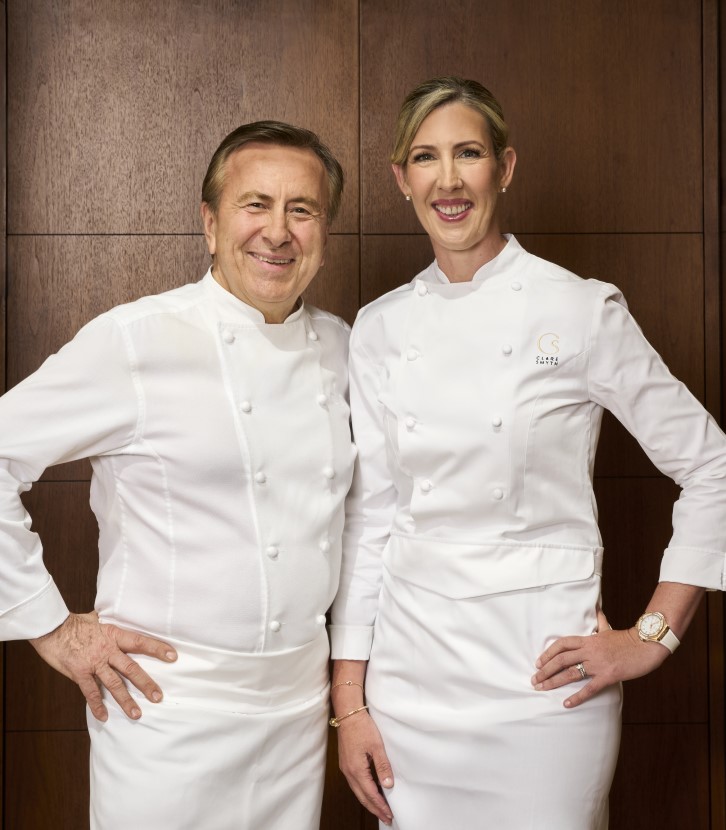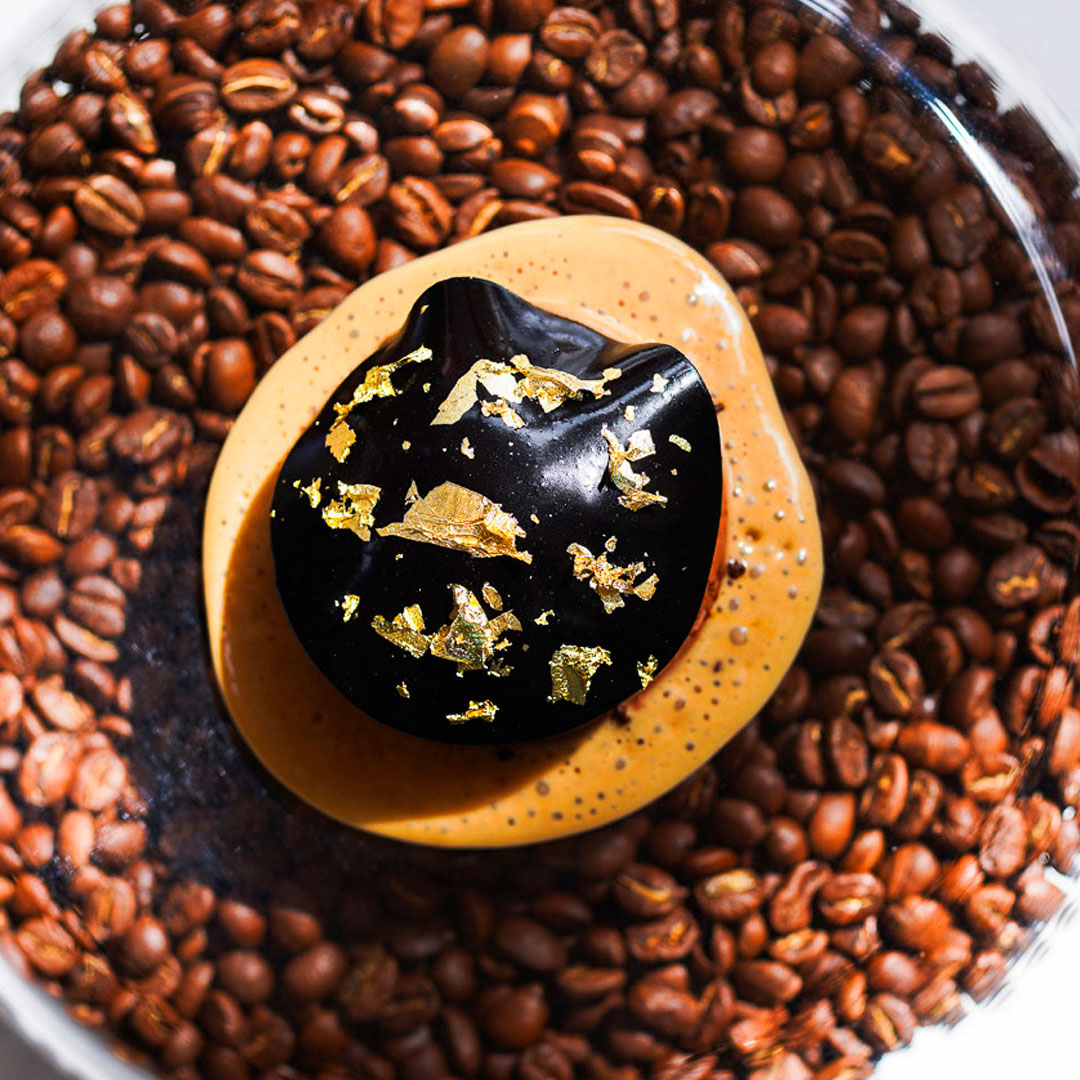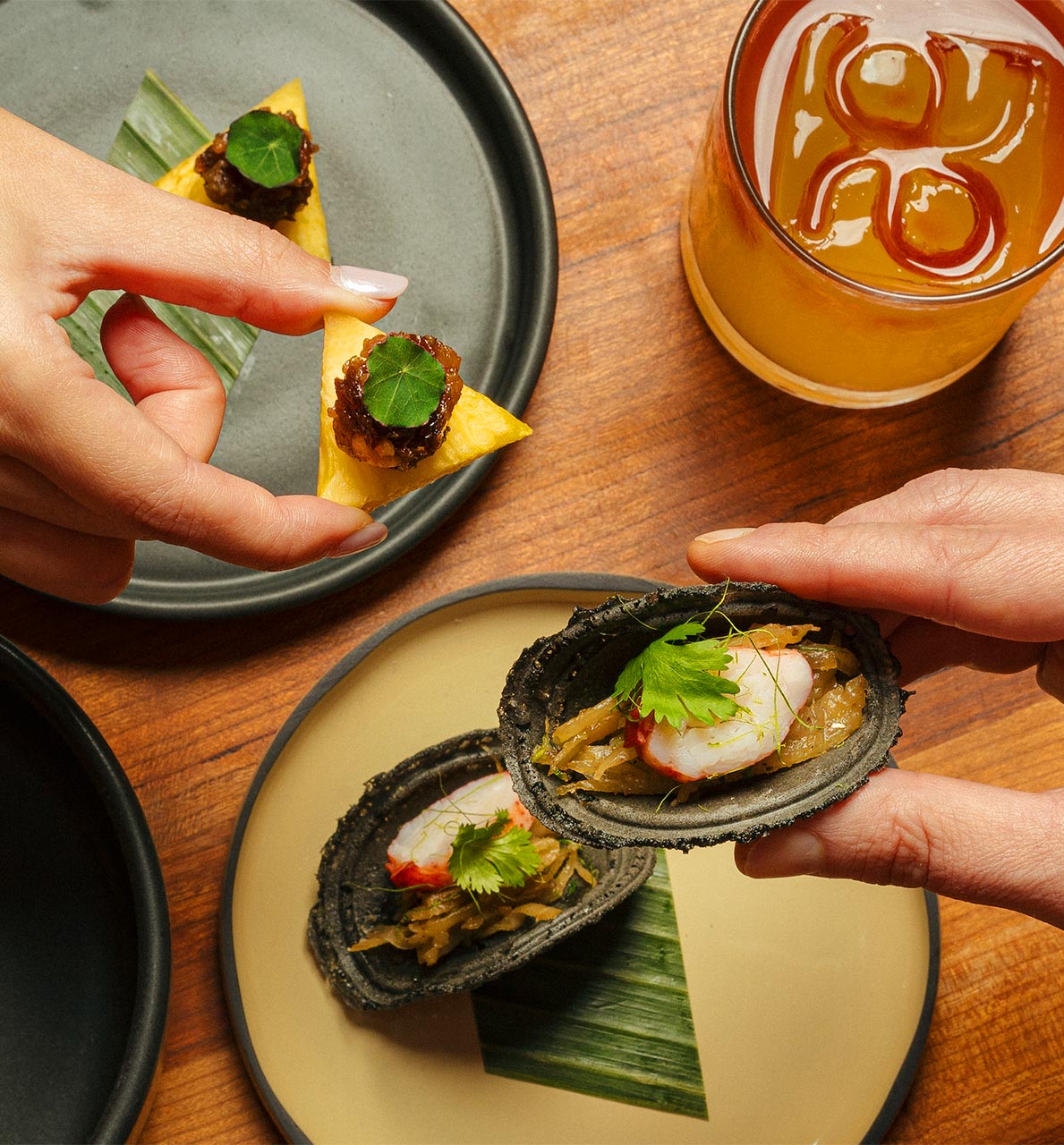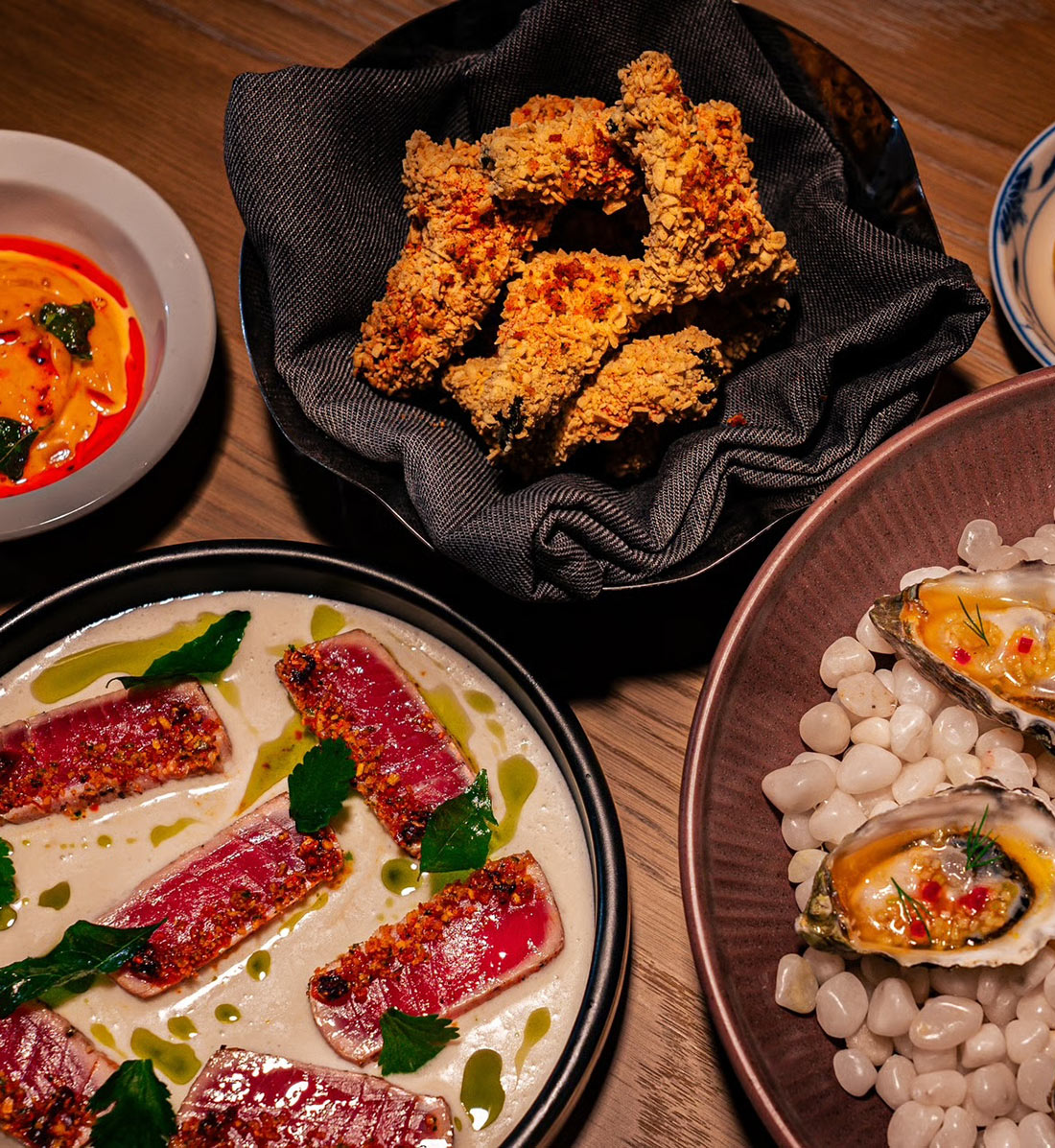In the middle of the Lincoln Park neighborhood in Chicago, there’s a mesmeric slice of the Middle East that can be found at MICHELIN One Star Galit. Opened by Chef Zach Engel in 2019, the MICHELIN-Starred restaurant showcases a four-course “choose-your-own-adventure” tasting menu offering a Midwest interpretation of Middle Eastern cuisine. Engel also developed the beverage program around this region with a wine list featuring underrepresented domains around the globe; a majority of selections are from small producers in Lebanon, Palestine, Israel, and Armenia.
“I knew the restaurant needed to have a wine and beverage program with the same intentionality and focus for what was in the glass as much as what is on the plate,” says Engel who decided a year before opening that he wanted to curate this style of wine list.
“I really like when we can get our hands on Dalton's Petillant Naturel of Semillon and Muscat for the first course of hummus, pita, and salatim,” says Engel. “Bubbles with our wood-fired pita bread is a great way to start the meal and it showcases the new wave of winemaking happening in the Middle East right now from these young and experimental winemakers.”

Other popular dishes like labneh, halab, and shawarma—many inspired by Engel’s time living and working in Tel Aviv—could be served aside a pour of Merwah, an indigenous varietal to Lebanon, produced by Mersel Wine, or Petit Verdot from Margalit Winery in Israel, both of which only produce 30,000 cases a year.
“Indigenous varieties like Merwah, Marini, Daw El Amar (moonlight), Obeidi, Maksasi which are unique to Lebanon and speak of the land and winemaking culture,” explains Eddie Chami from Mersel Wine. “I focus on keeping things minimal, doing all things by hand, to be as close to nature as possible.”

“Margalit Winery is the first boutique family-owned Israeli winery," says Asaf Margalit from Margalit Winery who began winemaking in 1989, using grapes from other vineyards. Now, they source from their estate. "’Infusing science and art into our creations’ is our motto. We embrace the sun and warm climate of Israel, to attain elegance with complexity, and wines with balanced acidity. Our style is also to keep the wines with an enjoyable freshness to match delicious food.”
Since many of the bottles can only be found in Chicago at Galit, we spoke with Engel as well as two of the Middle Eastern producers to learn more about what diners can expect from these unique wines as well as what they can expect to take away from this melodic pairing.

Can you share how you met a few of these producers and what it was like convincing them to export to you in Chicago?
When I was working in Tel Aviv, my girlfriend—now wife—flew to Israel and the first thing we did was take a bus to Hadeira, where Asaf Margalit [note: Margalit, the namesake of my oldest daughter, who is the namesake of the restaurant, is a household name in Israel] picked us up and brought us to the winery for a private tasting. We would buy Margalit Cabernet Franc by the case and it was always our celebration wine at anniversaries, birthdays, and at our wedding.
I've been working alongside Terra Sancta Trading Company for several years. The owner, Jason Bajalia, helped us get a lot of our initial list in place and we have grown with his guidance. He introduced us to Eddie Chami at Mersel in Lebanon, who is making beautiful wines, sometimes with native varietals and using ancestral and/or experimental methods. Over the years the importers and producers have seen how much demand for their wines has grown at Galit and they no longer need convincing.
What did you like about these certain varieties?
The Cab Franc from Margalit is a terrific food wine for us at Galit, and has a proven track record of aging well. To me, they execute a great example of what Cab Franc can be while the terroir shines through and keeps its identity as a wine from the Middle East. Mersel's Phoenix Skin Contact Merwah is made from 150 year old merwah vines, native to the region. I love that Eddie uses this wine and others to bring the history of Middle Eastern winemaking into the modern-day conversation.
Why did you think this niche wine list was important for standing out in the restaurant scene? How has the response been?
I want to ensure that every aspect of the dining experience at Galit is indicative of our identity as a restaurant. In my mind it would be bizarre to cook Middle Eastern food and serve hardly any or no wines from that part of the world. Cohesiveness between food and wine menus excites me when I dine at other restaurants.

Do you find people are hesitant to try these unfamiliar wines?
At first people were mostly uninterested in our Middle Eastern offerings. But as time went on and that section of our cellar grew, we've been able to offer more options from our program versus a Napa or European wine that a guest might favor more. So far, we have done really well getting folks to try new wines and get out of their comfort zone. We have a bit of a following now in that some people are just as excited, if not more excited, to be trying these wines over the cuisine.
How do you go about educating consumers to step out of their comfort zones?
Having the flexibility to steer people in our direction as well as how we engage with them at the table are crucial to turning them into Middle Eastern wine fanatics. We like to be inclusive for everyone's tastes, informative but not preachy or stale, and convey our excitement for how unique and delicious these wines are. This helped our guests to trust us and let us take the reins on their wine experiences.
Turning to the winemakers—Did you ever envision your wines would be served at a MICHELIN-Starred restaurant?
Eddie Chami, Mersel Wine: No! I am honored to know that my wines are in MICHELIN Star restaurants. I put my heart and soul in producing wines that I love and enjoy sharing. MICHELIN-Starred restaurants are known for producing dishes with utmost quality in a unique way. I feel my wines also are a representation of the utmost quality that I try to maintain whether it's in the vineyard where everything is organic, to the winemaking process where everything is minimal and made using unique winemaking styles. Not following a recipe, not following a formula, just making wines that have tension, like this land and the region, it's all based on what the land produces, the flavor profiles of the grapes that come in and basically what I have at hand. Art in food and art in wine, and a bit of luck and chakras.
Asaf Margalit of Margalit Winery: My family members are all avid foodies. Dining in elaborate restaurants is one of my favorite things to do with my wife. When I travel outside of Israel, I spend at least one evening in a MICHELIN-Starred restaurant on every trip. It is no secret that we also like to have guests over for a degustation dinner. Our wines are the kind we love to enjoy, and we know our customers love them as well. We strive for quality. We can easily imagine our wines being enjoyed and appreciated in a MICHELIN-Starred restaurant; in fact, happily our wines are represented at Le Bernardin in New York.

What does this opportunity mean to you?
Eddie Chami, Mersel Wine: MICHELIN-Starred restaurants set the bar really high, and having my wines in these restaurants motivates me to keep challenging myself to keep producing wines that keep raising that bar. Hearing the opinions of the chef, the sommeliers and the restaurant goers who have a complex palate is important to me in reflecting on how I made the wines and what I could do differently. However, on another note, I also want to clarify that when I created Mersel Wine, my ethos was to produce wines for everyday people, so even though I'm ecstatic that my wines are in Michelin-starred restaurants, I want everyday people to drink my wines and enjoy them too, price increases and profits aren’t a motivation, I price wines based on what it costs to produce them and some profit on top for me to live, this is also important to me. It's not a pretentious wine, it's for people to just pop it open, drink it in your house, in your backyard, during a picnic, on the beach… drink it anywhere as long as you enjoy it!
Asaf Margalit of Margalit Winery: It is a source of great pride and humility—in the same way that any artist hopes for exposure, acknowledgment, and respect from third parties. I hope to receive that exposure, acknowledgement and respect for our wines, from many people. People taste our wines specifically, but also are increasingly tasting Israeli wines in general. Being available in a Michelin-starred restaurant wine menu is a great honor and shows a great deal of respect from the food and wine community. It’s another seal of approval for our little winery.
What do you hope this platform allows for Americans to learn about your region?
Eddie Chami, Mersel Wine: I hope Americans look past the image that the media portrays "Lebanon" as being – destructive, dangerous, and a war-zone. As Lebanese people we invite and embrace people into our hearts through our food and drinks. We enjoy gathering around the dining table for hours eating and connecting with friends, drinking Arak, drinking wine, just laughing and having a good time. I want people to walk into a wine store and not be afraid to try something different, try a Lebanese wine, try a wine from Greece, Slovakia, Palestine, Israel, Turkey or a lesser known wine region, experience another culture through its wines. To me wine is peace, it’s a platform for me to connect with my neighbors in and around Lebanon, can you imagine how thriving this region would be, if it has peace!
Asaf Margalit of Margalit Winery: Israel in the Mediterranean is an upcoming wine country. In Israel, we are not bound by strict wine-making laws, such as regulations on the use of grape varieties. This allows us to experiment and investigate different approaches to viticulture and oenology. Among the varieties and blends on offer in Israel are all the international classical varieties, as well as many unexpected varieties and indigenous grapes, leading to fascinating blends. This complements very well the Mediterranean cuisine and diet, which flourishes in many countries around the world. There are many excellent wines from neighboring parts of our region, such as Lebanon, Greece, Cyprus, and Morocco. Try our wines and you will be surprised!





















